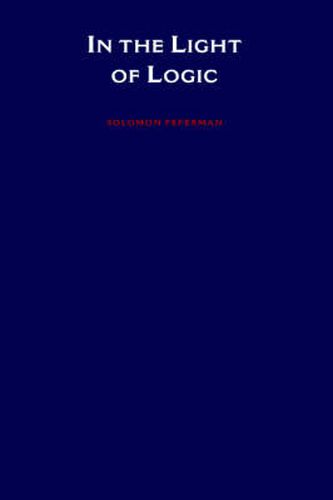Readings Newsletter
Become a Readings Member to make your shopping experience even easier.
Sign in or sign up for free!
You’re not far away from qualifying for FREE standard shipping within Australia
You’ve qualified for FREE standard shipping within Australia
The cart is loading…






In this collection of essays written over a period of twenty years, Solomon Feferman explains advanced results in modern logic and employs them to cast light on significant problems in the foundations of mathematics. Most troubling among these is the revolutionary way in which Georg Cantor elaborated the nature of the infinite, and in doing so helped transform the face of twentieth-century mathematics. Feferman details the development of Cantorian concepts and the foundational difficulties they engendered. He argues that the freedom provided by Cantorian set theory was purchased at a heavy philosophical price, namely adherence to a form of mathematical platonism that is difficult to support. Beginning with a previously unpublished lecture for a general audience, Deciding the Undecidable, Feferman examines the famous list of twenty-three mathematical problems posed by David Hilbert, concentrating on three problems that have most to do with logic. Other chapters are devoted to the work and thought of Kurt Goedel, whose stunning results in the 1930s on the incompleteness of formal systems and the consistency of Cantors continuum hypothesis have been of utmost importance to all subsequent work in logic. Though Goedel has been identified as the leading defender of set-theoretical platonism, surprisingly even he at one point regarded it as unacceptable. In his concluding chapters, Feferman uses tools from the special part of logic called proof theory to explain how the vast part–if not all–of scientifically applicable mathematics can be justified on the basis of purely arithmetical principles. At least to that extent, the question raised in two of the essays of the volume, Is Cantor Necessary?, is answered with a resounding no. This volume of important and influential work by one of the leading figures in logic and the foundations of mathematics is essential reading for anyone interested in these subjects.
$9.00 standard shipping within Australia
FREE standard shipping within Australia for orders over $100.00
Express & International shipping calculated at checkout
In this collection of essays written over a period of twenty years, Solomon Feferman explains advanced results in modern logic and employs them to cast light on significant problems in the foundations of mathematics. Most troubling among these is the revolutionary way in which Georg Cantor elaborated the nature of the infinite, and in doing so helped transform the face of twentieth-century mathematics. Feferman details the development of Cantorian concepts and the foundational difficulties they engendered. He argues that the freedom provided by Cantorian set theory was purchased at a heavy philosophical price, namely adherence to a form of mathematical platonism that is difficult to support. Beginning with a previously unpublished lecture for a general audience, Deciding the Undecidable, Feferman examines the famous list of twenty-three mathematical problems posed by David Hilbert, concentrating on three problems that have most to do with logic. Other chapters are devoted to the work and thought of Kurt Goedel, whose stunning results in the 1930s on the incompleteness of formal systems and the consistency of Cantors continuum hypothesis have been of utmost importance to all subsequent work in logic. Though Goedel has been identified as the leading defender of set-theoretical platonism, surprisingly even he at one point regarded it as unacceptable. In his concluding chapters, Feferman uses tools from the special part of logic called proof theory to explain how the vast part–if not all–of scientifically applicable mathematics can be justified on the basis of purely arithmetical principles. At least to that extent, the question raised in two of the essays of the volume, Is Cantor Necessary?, is answered with a resounding no. This volume of important and influential work by one of the leading figures in logic and the foundations of mathematics is essential reading for anyone interested in these subjects.